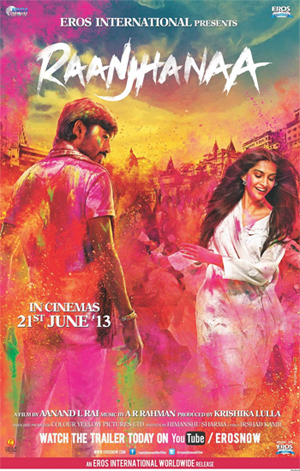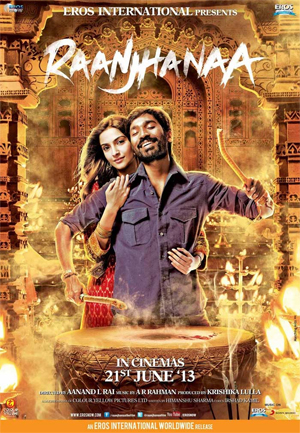 Easily one of the most awaited films of the year, Raanjhanaa captured our interests from the unconventional pairing of Sonam Kapoor and Dhanush, and Abhay Deol and the earthy tones from A.R.Rahman’s songs. Anand L Rai’s fourth feature after the sleeper hit, Tanu Weds Manu, looks to be an interesting and swooning love story especially through its gorgeous music. A.R.Rahman was so moved by the script of the film that he immediately agreed to sign up and do the background score for this love story, which can only mean good things for its prospects as an awaited summer movie. Raanjhanaa has been quite the lucky project for Rahman after the mixed reviews for his previous Hindi soundtracks for Jab Tak Hai Jaan and Ekk Deewana Tha. Yet, if detractors have pointed to a slump in Rahman’s output, then this soundtrack firmly proves his finesse and versatility in integrating the Banarsi spirit into this lovely album.
Easily one of the most awaited films of the year, Raanjhanaa captured our interests from the unconventional pairing of Sonam Kapoor and Dhanush, and Abhay Deol and the earthy tones from A.R.Rahman’s songs. Anand L Rai’s fourth feature after the sleeper hit, Tanu Weds Manu, looks to be an interesting and swooning love story especially through its gorgeous music. A.R.Rahman was so moved by the script of the film that he immediately agreed to sign up and do the background score for this love story, which can only mean good things for its prospects as an awaited summer movie. Raanjhanaa has been quite the lucky project for Rahman after the mixed reviews for his previous Hindi soundtracks for Jab Tak Hai Jaan and Ekk Deewana Tha. Yet, if detractors have pointed to a slump in Rahman’s output, then this soundtrack firmly proves his finesse and versatility in integrating the Banarsi spirit into this lovely album.
Starting with the addictive title track, Raanjhanaa, this was in the first trailer with Shiraz Uppal’s remarkable handle over the energetic wordplay by Irshad Kamil. Kamil’s lyrics set the tone for the track by conveying that madness and energy that this certain Raanjhanaa has. The singers Jaswinder Singh, who opens the song with a melodious alaap section and Shiraz Uppal strike that right chord in playing the energetic and upbeat lover. Uppal particularly is adept and has fun with the rapid-fire lines like the “tan thirke thirke, man behke behke, tere keh ke khud ko” which sticks with you long after the song. The highlight of the song has to be Rahman’s ability to capture that Banarsi spirit with dholaks and guitar riffs that layer the track. It certainly seems to match the pace of Dhanush’s wicked dancing abilities. There’s also a sitar solo by Asad Khan, who created that killer sitar tune in “Mausam & Escape” for Slumdog Millionaire. His section in the song just enhances the brilliance of the composition, and sends the listener into a swoon!
Next up is Banarasiyan, which is such a treat on the ears in its stirring composition. The opening prelude certainly draws the listener in with the combination of the flutes, dholak, sarangi, and sitar. The song conjures up the stunning ghats and sights of Banaras with its earthy elements and classical sound. The song manages to complement the setting of the piece, and bring out a new facet in Shreya Ghosal’s fabulous voice. Ghosal is rather ubiquitous these days, featuring in nearly every other song, but whenever teamed with A.R. Rahman, she just shines. Ghosal has fun with the middle verses and adds her own authentic flavour to the playful verses that Irshad Kamil pens. Meenal Jain and Anweshaa lend Ghosal support throughout, and add a bit of energy and pizazz to the track. The song is a simple one, but it’s the combination and superb composition that makes this one to savour for the Most Played List.
One of the highlights of the album is, Piya Milenge, which reunites the dream team A.R. Rahman with Sukhwinder Singh along with amazing group the KMMC Sufi Ensemble. The song surprises from the opening strands of the piano and the Ensemble chiming in, and segues into a Sufi qawalli with Sukhwinder bringing the passion and pathos with him. Singh is utterly brilliant here, especially in the latter half of the song where he has a natural and fruitful chemistry with the Ensemble. Irshad Kamil’s lyrics are wonderful in using the Sufi imagery of the Beloved and the divine relationship, it’s a very layered song that allows the listener to draw their own conclusions about the Piya in question. The KMMC Sufi Ensemble are wonderful in their solos and almost steal the show from the 4minute mark onwards. The song is truly one of the best Sufi compositions in Rahman’s oeuvre, because of its versatile appeal that makes you feel like a whirling dervish as well!
The playful, Ay Sakhi, is another gem that teams the talented foursome of Chinmayi, Madhushree, Vaishali, and Aanchal Sethi. The track is tons of fun as the singers are clearly enjoying the playful verses and the “tyu tyu tyu” and “pe pe pe” that are interspersed throughout. What starts off as a melodious alaap by the four singers gives way to a mischievous chemistry and nonsensical verses that are quite witty and impressive. Madhushree and Chinmayi are the clear pros here, but they give enough space for Vaishali and Aanchal Sethi to improvise and energize their voices. Kamil’s lyrics are eloquent and lend space for the singers to sound improvised and the last verse particularly is gorgeous. The composition is nice and simple with the ghatam, punchy tabla, and the electro beats complementing the voices in the midst. Give this one a try!
 Nazar Laaye is a dreamy and frothy treat in the unique combination of two singers like Rashid Ali and Neeti Mohan who has such smooth and delicate voices which makes this track stand out. The arrangements are quite minimal with the laidback acoustic guitar strumming in the back along with the fresh chord changes that make the composition fit perfectly with the lyrics. Rashid Ali is utterly smooth and his laconic style makes sure that the lyrics with you. Neeti Mohan is fast emerging as one of the most interesting performers from Ishq Wala Love to Jiya Re, with this one she takes it slow and has a warm and inviting chemistry with Ali.
Nazar Laaye is a dreamy and frothy treat in the unique combination of two singers like Rashid Ali and Neeti Mohan who has such smooth and delicate voices which makes this track stand out. The arrangements are quite minimal with the laidback acoustic guitar strumming in the back along with the fresh chord changes that make the composition fit perfectly with the lyrics. Rashid Ali is utterly smooth and his laconic style makes sure that the lyrics with you. Neeti Mohan is fast emerging as one of the most interesting performers from Ishq Wala Love to Jiya Re, with this one she takes it slow and has a warm and inviting chemistry with Ali.
Finally, A.R. Rahman guests on one of his tracks for Tu Mun Shudi, the phrase that is borrowed from an Amir Khusrau poem. This is an impossible track to pin down, as Rahman fuses so many elements to create a versatile and original that integrates the street sounds as well. The fusion of the car racing in the back alongside the shredded shehnaii sounds killer, and the punchy chorus in the background make this a really interesting and layered track. Rabbi Shergill is an innovative choice here, since his laidback and reedy voice seems an odd fit for such a fierce track, however he gives it all his vigor and verve. Shergill ensures that the rebellious message sticks with you, and Rahman is obviously great here but one does wish we heard him take a verse or two for this one. The song may be a divisive one since it may take time to grow on the listener, but just have a listen to all of those wicked instruments coming together in such a wicked track!
Aise Naa Dekho, is one of the cutest and naughtiest songs with the man telling a woman not to look at him seductively. The one thing that works with this mood and story is Rahman’s warm and dulcet tones for this soft-jazz tune. It does share some similarities with his other jazz song Tu Bole from Jaane Tu Ya Jaane Na, but this one is more minimalist and a tad slower. It may take some time for this one to warm up, and get going, as the lyrics are simple and elegant but may tend to get repetitive. Give this one a listen.
The Land of Shiva is a heady instrumental track that mixes in dhols, chants, bells, and religious chants that culminate to heavy climax. It’s only around a minute long, but it conjures up the mood and place of Banaras and is bound to be used in a key important scene in the narrative.
Tum Tak has my favourite from the album, since I just cannot resist Javed Ali’s dreamy and gorgeous voice. Ali has been lately called onto to be the resident romantic crooner for the key love songs in some films, but here he is able to display his versatility. Ali joins Keerthi Sagathia and Pooja AV who are reliable support for this treat. The manjeeras and guitar riffs welcome the listener in the opening, before Ali takes over with his marvellous vocals. The composition creates a lovely atmosphere; look out for the delicious manjheera and guitar interlude that may just melt you! The lyrics by Irshad Kamil are equally inspired with the Sufi touches in exploring the devotional and the romantic yearnings of this Raanjhana. The innovative repetition and altered meanings of Tum Tak in each verse are eloquent and just splendid in ensuring its iconic appeal. Pooja AV makes a brilliant debut, and her voice is that right balance of delicacy and strength, and she remarkably holds her own in such a grand song. The tone shifts to a Gujurati style with Sagathia’s entry at the 3.07 mark, and it just sends you into raptures because it blends seamlessly with the mood created. Keep this one on repeat!
Raanjhanaa is a brilliant return to form and originality for A.R. Rahman, who proves his detractors wrong with an album that captures the energy of its city and its lovestruck Raanjhana. The songs may just take time to grow on the listener, but that’s the joy in it, to savour all of the arrangements and voices that add up to a terrific and rustic album for the ages.











